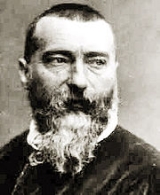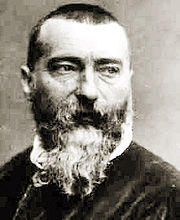
Jean-Baptiste Alphonse Karr
Encyclopedia

France
The French Republic , The French Republic , The French Republic , (commonly known as France , is a unitary semi-presidential republic in Western Europe with several overseas territories and islands located on other continents and in the Indian, Pacific, and Atlantic oceans. Metropolitan France...
critic
Critic
A critic is anyone who expresses a value judgement. Informally, criticism is a common aspect of all human expression and need not necessarily imply skilled or accurate expressions of judgement. Critical judgements, good or bad, may be positive , negative , or balanced...
, journalist
Journalist
A journalist collects and distributes news and other information. A journalist's work is referred to as journalism.A reporter is a type of journalist who researchs, writes, and reports on information to be presented in mass media, including print media , electronic media , and digital media A...
, and novelist. His brother Eugène was a talented engineer, and his aunt Carme Karr was a writer, journalist and suffragist in La Roche-Mabile
La Roche-Mabile
La Roche-Mabile is a commune in the Orne department in north-western France....
.
He was born in Paris
Paris
Paris is the capital and largest city in France, situated on the river Seine, in northern France, at the heart of the Île-de-France region...
, and after being educated at the Collège Bourbon, became a teacher there. Some of his novels, including his first, Sous les Tilleuls (1832), were autobiographical
Autobiography
An autobiography is a book about the life of a person, written by that person.-Origin of the term:...
romances. A second novel, Une heure trop tard, followed next year, and was succeeded by many other popular works. His Vendredi soir (1835) and Le Chemin le plus court (1836) continued the vein of autobiographical romance with which he had made his first success. Geneviève (1838) is one of his best stories, and his Voyage autour de mon jardin (1845) was deservedly popular. Others were Feu Bressier (1848), and Fort en thème (1853), which had some influence in stimulating educational reform.
In 1839 Alphonse Karr became editor of Le Figaro
Le Figaro
Le Figaro is a French daily newspaper founded in 1826 and published in Paris. It is one of three French newspapers of record, with Le Monde and Libération, and is the oldest newspaper in France. It is also the second-largest national newspaper in France after Le Parisien and before Le Monde, but...
, to which he had been a constant contributor; and he also started a monthly journal, Les Guêpes, of a keenly satirical tone, a publication which brought him the reputation of a somewhat bitter wit. His epigram
Epigram
An epigram is a brief, interesting, usually memorable and sometimes surprising statement. Derived from the epigramma "inscription" from ἐπιγράφειν epigraphein "to write on inscribe", this literary device has been employed for over two millennia....
s are frequently quoted, for example "plus ça change, plus c'est la même chose"—"the more it changes, the more it's the same thing", usually translated as "the more things change, the more they stay the same," (Les Guêpes, January 1849). On the proposal to abolish capital punishment
Capital punishment
Capital punishment, the death penalty, or execution is the sentence of death upon a person by the state as a punishment for an offence. Crimes that can result in a death penalty are known as capital crimes or capital offences. The term capital originates from the Latin capitalis, literally...
, "je veux bien que messieurs les assassins commencent"—"let the gentlemen who do the murders take the first step".
In 1848 he founded Le Journal. In 1855 he went to live at Nice
Nice
Nice is the fifth most populous city in France, after Paris, Marseille, Lyon and Toulouse, with a population of 348,721 within its administrative limits on a land area of . The urban area of Nice extends beyond the administrative city limits with a population of more than 955,000 on an area of...
, where he indulged his predilections for floriculture
Floriculture
Floriculture, or flower farming, is a discipline of horticulture concerned with the cultivation of flowering and ornamental plants for gardens and for floristry, comprising the floral industry...
, and gave his name to more than one new variety, notably the dahlia
Dahlia
Dahlia is a genus of bushy, tuberous, perennial plants native to Mexico, Central America, and Colombia. There are at least 36 species of dahlia, some like D. imperialis up to 10 metres tall. Dahlia hybrids are commonly grown as garden plants...
(New International Encyclopedia
New International Encyclopedia
The New International Encyclopedia was an American encyclopedia first published in 1902 by Dodd, Mead and Company. It descended from the International Cyclopaedia and was updated in 1906, 1914 and 1926.-History:...
). Indeed he practically founded the trade in cut flowers on the French Riviera
French Riviera
The Côte d'Azur, pronounced , often known in English as the French Riviera , is the Mediterranean coastline of the southeast corner of France, also including the sovereign state of Monaco...
. He was also devoted to fishing, and in Les Soirées de Sainte-Adresse (1853) and Au bord de la mer (1860) he made use of his experiences. His reminiscences, Livre de bord, were published in 1879–1880. He died at Saint-Raphaël
Saint-Raphaël, Var
Saint-Raphaël is a commune in the Var department in the Provence-Alpes-Côte d'Azur region in southeastern France.Immediately to the west of Saint-Raphaël lies another, older, town called Fréjus, and together they form an urban agglomeration known as Fréjus Saint-Raphaël...
(Var
Var (département)
The Var is a French department in the region Provence-Alpes-Côte d'Azur in Provence, in southeast France. It takes its name from the river Var, which used to flow along its eastern boundary, but the boundary was moved in 1860...
).
His short story Les Willis was the basis of Giacomo Puccini
Giacomo Puccini
Giacomo Antonio Domenico Michele Secondo Maria Puccini was an Italian composer whose operas, including La bohème, Tosca, Madama Butterfly, and Turandot, are among the most frequently performed in the standard repertoire...
's opera Le Villi
Le Villi
Le Villi is an opera-ballet in two acts composed by Giacomo Puccini to an Italian libretto by Ferdinando Fontana, based on the short story Les Willis by Jean-Baptiste Alphonse Karr. Karr's story was in turn based in the Central European legend of the Willis, also used in the ballet Giselle...
.
Novels
- Sous les Tilleuls (1832)
- Une heure trop tard (1833)
- Vendredi soir (1835)
- Le chemin le plus court (1836)
- Geneviève (1838)
- Voyage autour de mon jardin (1845)
- Feu Bressier (1848)
- Fort en thème (1853)
- Les Soirés de Sainte-Adresse (1853)
- Histoires Normandes (1855)
- Au bord de la mer (1860)
- Une poignee de verites (1866)
- Livre de bord (1879–80)

